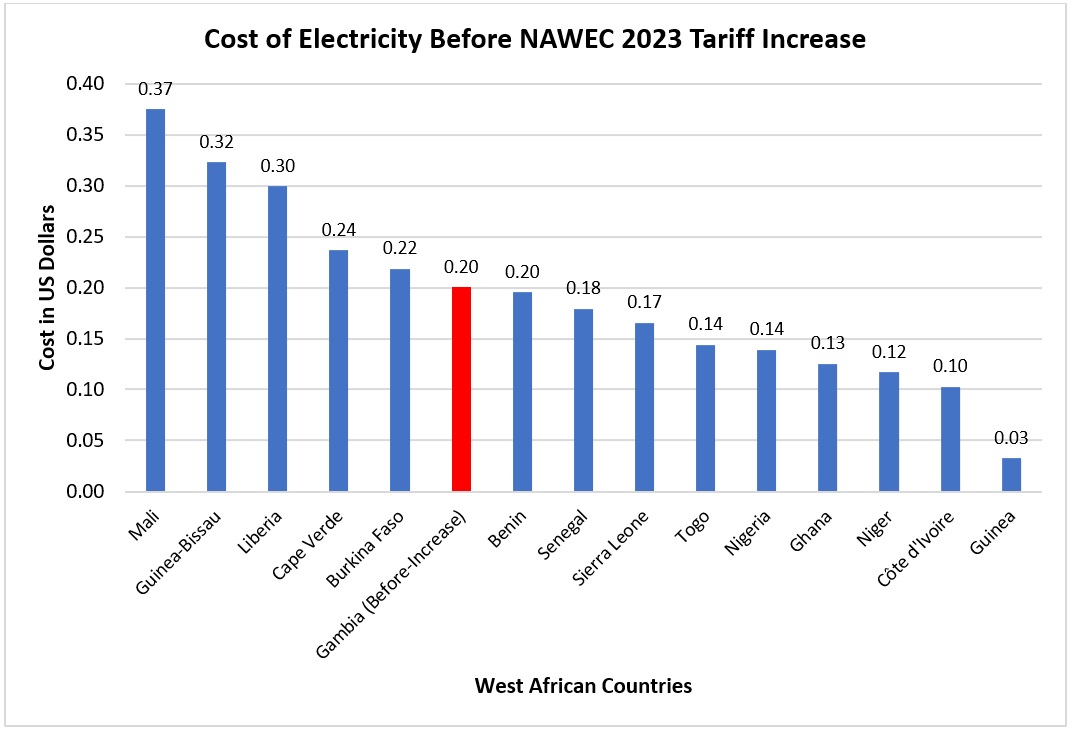 By Yusef Taylor, @FlexDan_YT
By Yusef Taylor, @FlexDan_YT
According to a study by Cable.co.uk, The Gambia was ranked the sixth most expensive West African country to purchase electricity. Before the latest electricity price hike, it was cheaper to purchase electricity in The Gambia than in Burkina Faso, Cape Verde, Liberia, Guinea Bissau and Mali.
It must be noted that Guinea Bissau, Mali and Burkina Faso are all going through political upheaval after facing coups and struggling to transition to democratic rule. Only Cape Verde and Liberia are countries with relatively stable civilian leadership.
This was The Gambia’s situation before the price hike. After the price hike, it’s now more expensive to purchase electricity in The Gambia than in Burkina Faso and nine other West African countries. Interestingly Senegal which supplies electricity to The Gambia is much cheaper than the Gambia coming in as the 8th most expensive in West Africa.
The Gambia’s National Water and Electricity Company announced a Tariff increase which took effect on 10th April 2023, leaving many Gambians concerned about the rising cost of living in the country given the 30% price hike on transportation at the start of 2023. In The Gambia increases don’t come gradually, the latest electricity price increase of approximately 37% now means The Gambia is ranked fifth most expensive in West Africa.
According to the study which “gathered data from 3,883 energy tariffs across the globe to compile the most complete league table of global consumer energy pricing yet” the cost of electricity in the smallest mainland African country was approximately $0.20 USD, however, our latest calculations show that the price of electricity has increased to $0.23 USD. Above is the cost of electricity as reported by Cable.co.uk back in 2021 which ranked The Gambia as the sixth highest in West Africa before the price hike by NAWEC. Another chart has been prepared using the new NAWEC Tariff increases.
Looking at a Cash power receipt before the price increase shows that D1,000 could purchase 97.4 kWh. This translates to D10.27 for 1 kWh which translates to approximately $0.17 US Dollars at a rate of D59.84 Gambian Dalasis per $1 US Dollar being the rate announced on the Central Bank of The Gambia’s website on 30th April 2023.
In comparison, a more recent Cash power receipt shows that D1,000 can now only purchase 71.3 kWh which translates to D14.03 for 1 kWh. This translates to $0.23 US Dollars per kWh. Our comparison of the cost of electricity before and after the price hike shows that the cost of electricity per kWh has increased by approximately D3.76 Gambian Dalasis and by $0.06 for every kWh.
According to a World Bank blog titled “Regional electricity trade, key to unleashing West Africa’s power” the price of electricity in West Africa is among the most expensive in the world. The blog written by World Bank’s Infrastructure Regional Director for Europe and Central Asia, Charles Cormier notes that “power supplies suffer from an average of 44 hours of outages per month and are among the most expensive in the world with prices averaging about $0.20 per kilowatt-hour”.
Given the latest price increase, The Gambia is now approximately $0.03 USD more expensive than the average price of electricity in West Africa. This means that it’s 15% more expensive to purchase electricity in The Gambia than the average price of electricity in West Africa. The blog also revealed that “West Africans pay about twice as much for electricity as their neighbours on the eastern side of the continent, and for those living in the region’s fragile states, prices can be as high as $0.40 per kilowatt-hour”.
Ultimately this means that “West Africans are being left behind in the race to compete in the global economy, with countries unable to deliver the essential services their populations need to lead healthy, productive lives. However, this is set to change”.
To reverse this trend and make electricity cheaper it’s recommended that West African states need to start “interconnecting neighbouring power systems and pooling energy resources, trade within the West African Power Pool could reduce energy costs while increasing power system resilience and reliability in the region”.

